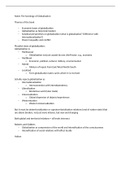Notes The Sociology of Globalization
Themes of the book
- Economic bases of globalization
- Globalization as historical/modern
- Sceptical perspectives on globalization (what is globalization? Difference with
internationalization?)
- Power inequality and conflict
Pluralist views of globalization;
Globalization is:
- Multicausal
o Globalization not just caused by one chief factor, e.g., economy
- Multilevel
o Economic, political, cultural, military, environmental
- Hybrid
o Mixture of inputs from East/West/North/South
- Localized
o Form globalization takes varies where it is received
Scholte rejects globalization as
- Internationalization
o Interconnection with interdependency
- Liberalization
o Borderless world (also trade)
- Universalization
o Global dispersion of objects/experiences
- Westernization
o Western Universalization
But it must be deterritorialization or supraterritorialization relations (end of nation-state) that
are above borders, not just more intense, but new and changing
Both global and territorial relations-> all levels intersect
Roberts and Giddens
- Globalization as compression of the world and intensification of the consciousness
- Intensification of social relations with effect locally
Holton
,Held
- Transregional interconnectedness and a widening of networks
- Regularization of world relations, intensification
- Development in transport and communications speed up the global interactions
- Impact of distant events being magnified, local developments with global consequences
Osterhammel and petersson
Definition of Globalization involves compression of space in terms of knowledge,
communication, movement
- Global in distance
o Global extensions of economy, politics and culture
- Globally inclusive in inputs
o It is not westernization
- Interdependency rather than just interconnection
- Stability and regularity in relations is needed
- It needs to involve more than elites, must include the masses
- Needs to be global consciousness
Having a definition helps to show considerations of power, inequality and conflict
Globalization as an ongoing development,
H1 Perspectives on Globalization: Divergence or Convergence?
Three waves of discussion
- Globalist
- Sceptical
- Transformationalist
Globalization theory started from 1980’s with focus on economy, politics culture and
diminishing territorial significance-> hyperglobalistic view
Globalist (hyperglobalist)
- Economic changes with political/cultural effects
- Transnational global forces take over from nations on economic, sovereign and identity
level
Sceptics (evidence and differentiation in effects)
- Globalists see global processes, but these aren’t really global
- Nation states remain very powerful
- There is still national identity
, - Sceptics want globalist’s claims to be tested
- Are these processes globally inclusive?
- Global economy is not globalized but merely more internationalized
- Is free trade solving poverty?
- Is the effect of political globalization equal?
- Is the effect of cultural globalization similar across countries?
Transformationalists (third wave-> critical, but acknowledge globalization)
- See interdependency
- Common issues create global politics, but nation states still matter and are actors
- Differentiation in effects of globalization does not mean globalization is absent
- Structures both continue and transform
- Acknowledged uncertainty-> don’t know where globalization will lead
Globalists Sceptics Transformationalists
Globalization Globalization as Globalization as a Global
causal discourse; transformations, but
internationalization differentiation and
as effect of other embeddedness
causes
Method Abstract, general Empirical approach Qualitative rather
approach than quantitative
approach
Economy Global economy; International Globally
integration, open; economy; triadic, transformed; new
free trade regional, unequal; stratification;
state intervention globalized but
and protectionism differentiated
Politics Global governance or Nation-states, Politics globally
neoliberalism; regional blocs, transformed; nation-
decline of nation- international; power states important but
state; loss of national and inequality; reconstructed;
sovereignty political agency sovereignty shared
possible
Culture Homogenization Clashes of culture; Globally
nationalism; transformed;
Americanization; hybridization;
globalization complex,
differentiated differentiated
globalization
History Globalization as new Internationalization Globalization old but
as old present form
unprecedented





